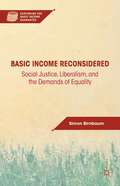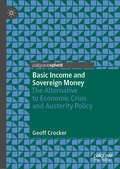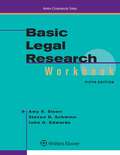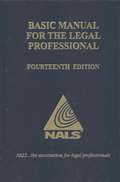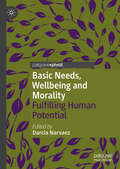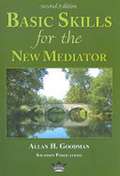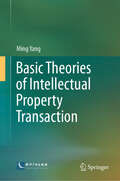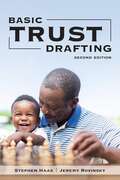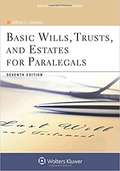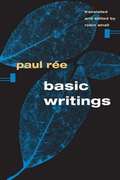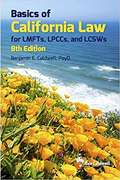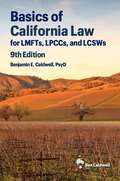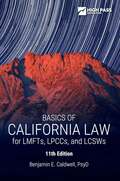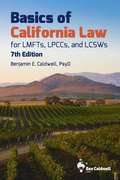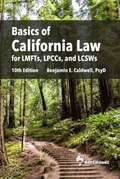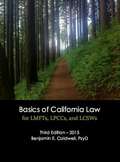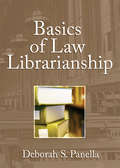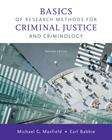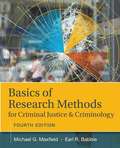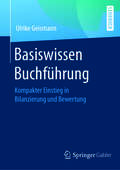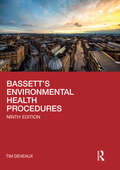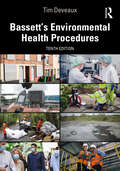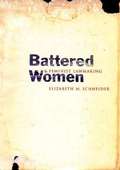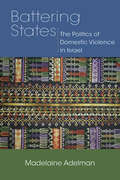- Table View
- List View
Basic Income Reconsidered
by Simon BirnbaumBasic income is one the most innovative, powerful and controversial proposals for addressing poverty and growing inequalities. This book examines the arguments for and against basic income from the point of view of economic and social justice.
Basic Income and Sovereign Money: The Alternative to Economic Crisis and Austerity Policy
by Geoff Crocker“This is a radical, thought-provoking book, which brings together debates that are often kept separate about basic income and 'sovereign money'. You might not agree with all of it, but it makes big arguments and does so with constructive intent: that of proposing alternative ways of organising our economy and welfare states.”Nick Pearce, Director of The Institute for Policy Research, University of Bath, UK“Though I have criticized modern money theory (MMT) for being too facile regarding the consequences of money financed deficits, I welcome this book’s advocacy of a universal basic income. MMT proponents have focused on the problem of employment. Geoff Crocker wants to shift the focus to basic income, and I believe he is right. We are in an era of transition. Employment was the fundamental problem of the 20th century. Income distribution will be the fundamental problem of the 21st century. We must begin transitioning the policy discourse now. In coming decades we will need both employment and basic income policy. It is good to have MMT advocates on board.”Thomas Palley, independent economist, Washington, DC, USA"Geoff Crocker's book is a very stimulating and provoking contribution to the discussion of how to define, identify, and finance basic income. It addresses very clearly the societal issue of a monetary basic income funding which will excite the discussion beside well --known tax proposals, and establishes the discussion on integrating basic income directly into crisis prevention and crisis solution."Bernhard Neumärker, Götz Werner Professor of Economic Policy & Constitutional Economic Theory and Head of Freiburg Institute for Basic Income Studies (FRIBIS) at the University of FreiburgThe current economic system is dysfunctional, characterised by crises, austerity, excessive household and government debt, low pay, poverty, inequality, and ecological damage. This needs a radical re-think and re-engineering of the economic system. The standard explanation of the 2007 economic crisis is that banks behaved badly and governments failed to regulate. But policies of tighter bank regulation, quantitative easing, and austerity failed, and proved counter-productive. This book challenges this orthodox view. From a careful analysis of long-term economic data, it shows that earned income has inexorably fallen behind economic output, leading to huge increases in consumer debt, causing the crisis. Governments have sought to curtail deficit spending by socially harmful austerity policy. The answer is a universal basic income, funded by debt-free sovereign money, which also funds government social expenditure, always limited by economic output to avoid inflation. This book will appeal to policy makers, academic economists, think tank networks, and everyone who is concerned with the ongoing dysfunctionality of the current economic system.
Basic Legal Research Workbook (Aspen Coursebook)
by John Edwards Amy Sloan Steven SchwinnWith a balance of online and traditional print sources, the Fifth Edition of BASIC LEGAL RESEARCH WORKBOOK encourages independent, experiential learning. Proven effective in the classroom, the authors’ carefully developed problems gradually progress from introductory to more complex. Whether accompanying Amy Sloan’s BASIC LEGAL RESEARCH: TOOLS AND STRATEGIES, or any other legal research text, these exercises provide hands-on practice throughout the course that will serve students well in their careers as lawyers.
Basic Manual for the Legal Professional
by NalsNALS Basic Manual for the Lawyer's Assistant, 14th, a guide for legal professionals, lays out legal principles and approved law office procedures for those who have previous experience in the legal fields. It assumes a working knowledge of legal terminology and law office procedure, and includes chapters on career development, ethics, law office management, computer information systems, and accounting, legal writing and legal research, the courts and administrative agencies, trial preparation, civil procedure, and criminal procedure, Torts, contracts, real estate transactions, landlord and tenant, estate planning, estates, guardianships, and family law, business organizations, bankruptcy, taxation, and arbitration, environmental law, water law, and oil and gas law, labor law, intellectual property law, pension and profit sharing plans, and workers' compensation law, admiralty and maritime law, antitrust law, and immigration law, and Federal civil rights and employment discrimination laws. Easy-to-read charts, diagrams, and illustrations provides practical guidance on topics the successful lawyer's assistant must address every day. A bibliography, several glossaries and index are also included.
Basic Needs, Wellbeing and Morality: Fulfilling Human Potential
by Darcia NarvaezBasic needs fulfilment is fundamental to becoming human and reaching one’s potential. Extending the BUCET list proposed by Susan Fiske - which includes belonging, understanding, control/competence, autonomy, self-enhancement, trust, purpose and life satisfaction - this book demonstrates that the fulfilment of basic needs predicts adult physical and mental health, as well as sociality and morality. The authors suggest that meeting basic needs in childhood vitally shapes one’s trajectory for self-actualization, and that initiatives aimed at human wellbeing should include a greater emphasis on early childhood experience. Through contemporaneous and retrospective research in childhood, the authors argue that basic need-fulfilment is key to the development of the self and the possibility of reaching one’s full potential. This book will be of interest to scholars of human wellbeing and societal flourishing, as well as to health workers and educators.
Basic Skills For The New Mediator
by Allan H. GoodmanBASIC SKILLS FOR THE NEW MEDIATOR provides a detailed overview of mediation, from the premediation conference through all stages of the mediation session. It guides the new mediator through the mediation process by answering the one hundred questions most frequently asked by new mediators. BASIC SKILLS FOR THE NEW MEDIATOR has been used successfully for self-instruction and as a training manual. Experienced mediators and attorneys who represent clients in mediation will also find this book extremely useful. The Appendix "Everything You Never Wanted to Know About the Rules of Evidence" is especially valuable for the non-attorney mediator, who must often deal with the evidentiary vocabulary of the legal profession. You will learn to establish your authority as a mediator, schedule the mediation session, deliver the mediator's opening statement, prioritize issues, preside during joint sessions, conduct private caucuses, overcome impasses, identify "hidden agenda" and "throwaway" items, deal with parties who lack settlement authority, and aid parties to achieve a viable settlement.
Basic Theories of Intellectual Property Transaction
by Ming YangFrom the perspective of the market, this book discusses the basic theories and operation mechanism of intellectual property transactions based on the behavior choice theory, aiming to deeply understand how the specific systems and rules of intellectual property are operated or applied beyond the external form of system application. China's long-standing intellectual property legal doctrines and the corresponding knowledge system (whether legislative, judicial or theoretical research) deserve reflection in three aspects: (i) the neglect of market principles; (ii) the lack of behaviorism research perspectives and methods, and (iii) the lack of systematic degree of existing research. This book is an introspection on the basic theoretical research of intellectual property in China from the above three aspects. This book closely focuses on the coupling relationship between "system implementation" and "behavior choice," along with the logical context of intellectual property transactions, the institutional mechanism behind the specific transaction forms is investigated, and its benefits are analyzed. And, the essence of the economic mechanism of the intellectual property system is deeply interpreted from both theoretical and practical aspects. The target audience is intellectual property law researcher, and the content level is the theoretical foundation research. Starting from the principles of the entitlement of intellectual property, this book tries to reveal the institutional implication of the creation of right, the boundary of right and the attribute of right. And, this book also tries to sort out the matching attribute between the existing intellectual property systems and the operation of the intellectual property market. Finally, by analyzing the correlation between the market environment and the subject's behavior choice, this book tries to clarify the internal logic between "system," "market" and "behavior." These aforesaid features will help IP researchers deeply understand how existing legal systems and rules affect specific intellectual property transactions.
Basic Trust Drafting
by Stephen Haas Jeremy RovinskyThe second edition of Basic Trust Drafting (formerly titled Trust Drafting for Paralegals) includes coverage of considerable updates to the relevant tax laws, as amended by the Tax Cuts and Jobs Act of 2017. Basic Trust Drafting takes a practical look at a wide variety of problems and concerns faced by clients who solicit elder care and estate planning help. It concentrates on estate tax, Medicaid planning, and creditor protection issues, focusing on the solutions that trusts provide to many common problems. Examples inspired by real life cases are presented to ensure that the information presented is practical and useful. Actual trust provisions are presented as suggestions for how concepts in the text can be put into practice. The text does not delve deeply into the theory behind the applicable rules and does not exhaustively analyze the relevant statutes and cases. Instead, the text is designed to caution the student of what pitfalls to watch for when analyzing a client s case, and to provide a working understanding of the issues most likely to emerge in real life and the starting points for analyzing and solving those issues. Special attention is devoted to enabling the student to interweave common issues so that, to the extent possible, the client does not have to sacrifice one tax or Medicaid planning benefit for another.
Basic Wills, Trusts, and Estates For Paralegals (Aspen College)
by Jeffrey A. HelewitzA leading text in its field, Basic Wills, Trusts, and Estates for Paralegals focuses on a paralegal’s role in practice. Introductions, explanations, instructions, and study aids ensure that students learn and remember concepts and skills that will prove essential to their work as paralegals. <P><P> Respected by instructors and popular with students, Basic Wills, Trusts and Estates for Paralegals features: • A straightforward introduction that provides a student-friendly orientation to the subject • Complete, succinct coverage of key topics • A review of the sources of property law, trusts, and taxes • A helpful guide to drafting wills and trusts documents • Step-by-step instruction for completing the entire federal estate tax return • State-by-state analysis of trust and estate law • Four client examples used throughout the text that provide an accessible structure and illustrate the intricacies of estate planning • Chapter overviews, key terms, review questions, sample clauses, edited cases, chapter summaries, and end-of-chapter exercises • Latest sample forms in the Appendix • A manageable length that makes this book ideal for shorter courses <P><P> The carefully revised Seventh Edition includes: • The impact of Obergefell v. Hodges on wills and trusts • Changes to WTE tax law • The legal status of children born after the death of one or both parents (because their parents’ eggs, sperm, or fertilized eggs were frozen) • Disclaimer trusts, asset protection trusts, qualified personal residence trusts, and dynasty trusts • Mediation as an alternative to probate court • The Surface Transportation and Veterans Health Care Choice Improvement Act of 2015 • Introduction of new self-test quizzes at the end of each chapter
Basic Writings
by Robin Small Paul ReeThis book contains the first English translations of The Origin of the Moral Sensations and Psychological Observations, the two most important works by the German philosopher Paul Rée. These essays present Rée's moral philosophy, which influenced the ideas of his close friend Friedrich Nietzsche considerably. Nietzsche scholars have often incorrectly attributed to him arguments and ideas that are Rée's and have failed to detect responses to Rée's works in Nietzsche's writings. Rée's thinking combined two strands: a pessimistic conception of human nature, presented in the French moralists' aphoristic style that would become a mainstay of Nietzsche's own writings, and a theory of morality derived from Darwin's theory of natural selection. Rée's moral Darwinism was a central factor prompting Nietzsche to write On the Genealogy of Morals and the groundwork for much of today's "evolutionary ethics." In an illuminating critical introduction, Robin Small examines Rée's life and work, locating his application of evolutionary concepts to morality within a broader history of Darwinism while exploring Rée's theoretical and personal relationship with Nietzsche. In placing Nietzsche in his intellectual and social context, Small profoundly challenges the myth of Nietzsche as a solitary thinker.
Basics Of California Law For LMFTs, LPCCs, And LCSWs
by Benjamin E. CaldwellWritten by a therapist for other therapists (and therapists in training), Basics of California Law takes the many nuances of California law and regulation and puts them in digestible, easy-to-apply language. It covers all three of California's major masters-level mental health professions: Marriage and Family Therapy, Professional Clinical Counseling, and Clinical Social Work.
Basics Of California Law For Lmfts, Lpccs, And Lcsws
by Benjamin E. CaldwellWritten by a therapist for other therapists (and therapists in training), Basics of California Law takes the many nuances of California law and regulation and puts them in digestible, easy-to-apply language. It covers all three of California's major masters-level mental health professions: Marriage and Family Therapy, Professional Clinical Counseling, and Clinical Social Work. This ninth edition is updated to 2022 law, and includes the following changes: Major changes in supervision requirements Updates to LMFT and LPCC scopes of practice Updated information on telehealth New information on working from home New information on holding multiple licenses New requirements for Emotional Support Animal letters And much more.
Basics Of California Law For Lmfts, Lpccs, And Lcsws
by Benjamin E. CaldwellWritten by a licensed therapist, Basics of California Law takes the many nuances of California law and regulation and puts them in digestible, easy-to-apply language. It covers all three of California's major masters-level mental health professions: Marriage and Family Therapy (LMFTs), Professional Clinical Counseling (LPCCs), and Clinical Social Work (LCSWs). This 11th edition is updated to 2024 law, and includes changes to the rules on elder and dependent adult abuse reporting and more. Topics covered in this text include Licensing, Supervision, Confidentiality, Documentation, Families and Children, Abuse Reporting, Technology, Business and Marketing, Employment, Unprofessional Conduct, and Advocacy.
Basics of California Law for LMFTs, LPCCs, and LCSWs
by Benjamin E. CaldwellThis seventh edition is updated to 2020 law and professional ethics codes, and includes new information on telehealth, employment law, license portability, testimonials, and more.Written by a therapist for other therapists (and therapists in training), Basics of California Law takes the many nuances of California law and regulation and puts them in digestible, easy-to-apply language. It covers all three of California's major master's-level mental health professions: Marriage and Family Therapy, Professional Clinical Counseling, and Clinical Social Work.Topics covered include Licensing, Supervision, Unprofessional Conduct, Confidentiality, Documentation, Families and Children, Abuse Reporting, Business & Marketing, Technology, and Advocacy. The text includes hundreds of footnotes identifying specific articles, links, and sections of California law and regulation that serve as reference material for this text.
Basics of California Law for LMFTs, LPCCs, and LCSWs
by Benjamin E. CaldwellThe leading guide to legal requirements for California master's level mental health professionals is updated with dozens of substantive changes and hundreds of minor and technical ones, updating to 2023 law and adding detail on key issues impacting clinical practice. Topics covered include the licensure process, supervision, abuse reporting, unprofessional conduct, confidentiality and privilege, documentation, working with couples and families, telehealth, marketing, and advocacy. 2023 legal changes integrated into this 10th edition include new laws on video supervision, continuing education, telehealth training, temporary licensure, pay transparency, and much more. Used in graduate programs around the state, and as a desk reference for LMFTs, LPCCs, and LCSWs at all career levels. Author Benjamin E. Caldwell, PsyD is a California licensed marriage and family therapist and Adjunct Faculty for California State University Northridge.
Basics of California Law for LMFTs, LPPCs, And LCSWs
by Benjamin E. CaldwellWritten by a therapist for other therapists. (and therapists in training), Basics of California Law takes the many nuances of California law and regulation and puts them in digestible, easy-to-apply language. It covers all three of California's major masters-level mental health professions: Marriage and Family Therapy, Professional Clinical Counseling, and Clinical Social Work. Topics covered include Scope of Practice, Licensing Requirements, Unprofessional Conduct, Informed Consent, Confidentiality and Privilege, Working with Minors (including detailed information on child abuse reporting),...
Basics of Law Librarianship
by Deborah Panella Ellis MountHere is an essential introductory guide on all aspects of law librarianship written especially for non-law librarians, library school students, and beginning law librarians. Although there are several excellent practical handbooks and numerous articles on specific topics of law librarianship for practicing law librarians, Basics of Law Librarianship is the only resource that addresses the information needs of the student or new law librarian. Author Deborah Panella, managing librarian of a large, prominent New York law firm, explores the major areas of law librarianship. She covers vital topics such as the legal clientele, collection development, research tools, technical services, impact of technology, and management issues, and describes what makes law libraries different from other special libraries. She has written a clear, readable volume without excessive detail or the use of special terminology. The bibliography of law library literature and the index add enormously to the book’s value as a major reference.
Basics of Research Methods for Criminal Justice and Criminology
by Earl R. Babbie Michael G. MaxfieldThe text introduces you to the basics of criminal justice research utilizing real data and featuring coverage of such key issues as ethics, causation, validity, field research, and research design.
Basics of Research Methods for Criminal Justice and Criminology
by Earl R. Babbie Michael G. MaxfieldA concise paperback based on Maxfield and Babbie's best-selling RESEARCH METHODS FOR CRIMINAL JUSTICE AND CRIMINOLOGY, this "basics" version combines accessibility and a conversational writing style with Michael G. Maxfield's expertise in criminology and criminal justice. In fewer than 400 pages, BASICS OF RESEARCH METHODS FOR CRIMINAL JUSTICE AND CRIMINOLOGY, Fourth Edition, introduces students to the core of criminal justice research. It utilizes the most current, real data and features coverage of such key topics as ethics, causation, validity, field research, and research design, among others. The Fourth Edition includes expanded coverage of qualitative research and interviewing, focus groups in criminological research, and snowball sampling, as well as additional examples of student research. Balancing coverage of both qualitative and quantitative methods, the text is packed with real-world examples, practical applications, and Internet research exercises.
Basiswissen Buchführung: Kompakter Einstieg in Bilanzierung und Bewertung
by Ulrike GeismannDieses Buch vermittelt einen konzentrierten Einstieg in den Prozess des Buchens. Schnell versetzt es den Leser in die Lage, die Systematik der Buchf#65533;hrung zu verstehen und eigenst#65533;ndig einen kleinen Jahresabschluss von der Er#65533;ffnungsbilanz am Jahresanfang bis hin zur Schlussbilanz am Jahresende mit allen dazugeh#65533;rigen unterj#65533;hrigen Buchungen zu erstellen. Auch die diversen Bewertungsfragen der Handels- und Steuerbilanz werden ber#65533;cksichtigt. Dieses Basiswissen wird in allen kaufm#65533;nnischen Ausbildungsberufen und fast allen kaufm#65533;nnischen Studieng#65533;ngen ben#65533;tigt.
Basiswissen Insolvenz: Schneller Einstieg in Insolvenzprävention und Risikomanagement
by Bernd Heesen Vinzenth Wieser-LinhartDieses Buch richtet sich an Praktiker, die in einfach nachvollziehbaren Schritten Insolvenzrisiken erkennen lernen wollen. Nach einer kompakten Einführung in die Rechtslage in Deutschland und Österreich wird mit einem Beispiel gezeigt, wie anhand der Bilanz und der GuV potenzielle Insolvenztatbestände erkannt und analysiert werden können.Die Analyse des Zahlenwerks ist mit geringen buchhalterischen Kenntnissen, mit wenigen Kennzahlen und auf einfachem mathematischem Niveau möglich. Mithilfe des zusätzlich zum Buch zur Verfügung stehenden Excel-Tools können alle Schritte im eigenen Unternehmen nachvollzogen werden. Die Autoren zeigen mit diesem Buch die Chancen auf, die die Insolvenz als Instrument zur Unternehmenssanierung gegenüber der außergerichtlichen Sanierung birgt.
Bassett's Environmental Health Procedures
by Tim Deveaux W.H. BassettEnvironmental health law is a wide-ranging, detailed and complex body of law within the UK. Bassett’s Environmental Health Procedures is an established and essential reference source which provides an accessible entry into enforcement and administrative procedures for environmental health. The main legal procedures used in the environmental health field are presented as flow charts supported by explanatory text. This ninth edition refines the structure introduced in the eighth edition, with each chapter addressing a single topic. It has introduced the titles of the corresponding legislation in Scotland and Northern Ireland where there is such legislation. The book has been updated throughout to reflect new practices, legislation and statutory guidance. Specifically, the ninth edition contains new content on Antisocial Behaviour and significant updates to sections on: Enforcement and Administration Environmental Protection Food Safety Housing and Public Health Environmental Health Officers/Practitioners and students will find this book invaluable. It will also be an essential reference for all those whose responsibilities demand they keep abreast of current environmental health practices.
Bassett's Environmental Health Procedures
by Tim Deveaux W.H. BassettBassett’s Environmental Health Procedures is a long-standing, must-have reference book for practising environmental health officers in local government and in private practice. It covers all the key legislative procedures for the service of a wide range of notices to deal with public health problems throughout the UK. The tenth edition covers the following subjects and reflects new practices, legislation and statutory guidance: The legal framework Environmental protection – including air quality, noise, pollution control Food safety Health and safety at work Housing Port health Public health Each procedure includes a simple description of the legislation and a flow diagram showing the procedure to follow in using that legislation. Written for the increasingly pressurised local authority environmental health practitioner, this book will help them to understand the legislation quickly and easily and how to deploy it effectively. Bassett’s is also an essential reference for all those whose responsibilities demand they keep abreast of current environmental health practices.
Battered Women and Feminist Lawmaking and the Struggle for Equality
by Elizabeth M. SchneiderThis book examines the pathbreaking legal process that has brought the pervasiveness and severity of domestic violence to public attention and has led the United States Congress, the Supreme Court, and the United National to address the problem.
Battering States: The Politics of Domestic Violence in Israel
by Madelaine AdelmanBattering States explores the most personal part of people's lives as they intersect with a uniquely complex state system. The book examines how statecraft shapes domestic violence: how a state defines itself and determines what counts as a family; how a state establishes sovereignty and defends its borders; and how a state organizes its legal system and forges its economy. The ethnography includes stories from people, places, and perspectives not commonly incorporated in domestic violence studies, and, in doing so, reveals the transformation of intimate partner violence from a predictable form of marital trouble to a publicly recognized social problem.The politics of domestic violence create novel entry points to understanding how, although women may be vulnerable to gender-based violence, they do not necessarily share the same kind of belonging to the state. This means that markers of identity and power, such as gender, nationality, ethnicity, religion and religiosity, and socio-economic and geographic location, matter when it comes to safety and pathways to justice.The study centers on Israel, where a number of factors bring connections between the cultural politics of the state and domestic violence into stark relief: the presence of a contentious multinational and multiethnic population; competing and overlapping sets of religious and civil laws; a growing gap between the wealthy and the poor; and the dominant presence of a security state in people's everyday lives. The exact combination of these factors is unique to Israel, but they are typical of states with a diverse population in a time of globalization. In this way, the example of Israel offers insights wherever the political and personal impinge on one another.
